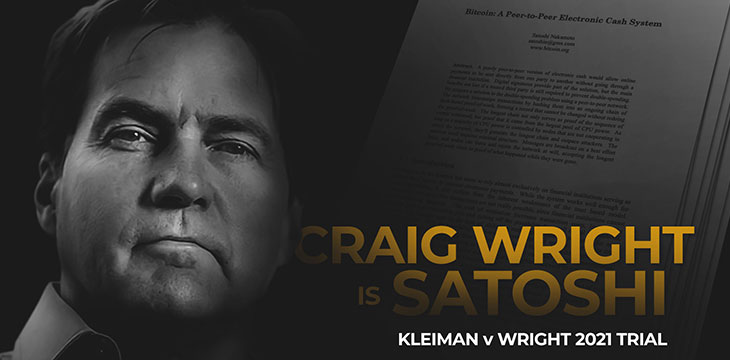It’s been almost four years since Ira Kleiman first served his lawsuit on Dr. Craig Wright, and in the intervening time, Dr. Wright has been drawn into yet more legal battles with each seemingly drawing more visceral reactions from observers than the last. The long-time-coming Kleiman v Wright trial is now upon us, and many of these legal cases have disappeared quicker than they came. In fact, Kleiman will be the first of Dr. Wright’s cases to make it to trial.
Why is this?
First, it should be noted that Kleiman is one of the few cases which finds Dr. Wright as the defendant. By and large, the cases which have attracted media attention over the past couple of years have been instances of Dr. Wright being the plaintiff: his libel cases, his campaign to reclaim the Bitcoin white paper, his stolen coins cases—these are all actions launched by Dr. Wright with a definitive goal in mind—he wants compensation (or vindication) for having his reputation maligned, or he wants to make sure bad actors can’t misappropriate his white paper. These goals don’t ever change, no matter what happens over the course of the litigation.
The same can’t be said for his defendants, who find themselves as having to defend their conduct in a court of law and are unable to do so with the rigorous standards of evidence found therein—at great cost. At that point, as a defendant, the goal is to not lose, or limit the damage as best as possible (either by staying anonymous, as Cobra did, or playing jurisdictional games, as Hodlonaut has, or by ripping the band-aid off and abandoning the defense almost entirely, as Peter McCormack did).
In contrast, Ira Kleiman is the aggressor in his lawsuit against Dr. Wright, and he thinks he’s on the cusp of an historic payday. If Dr. Wright wins, then all Ira Kleiman loses is time and money spent on legal fees—both of which pale in comparison to the billions that Ira thinks are coming to him should he win.
However, the most important distinction between Kleiman v Wright and these other cases is that it’s the only one where Dr. Wright’s status as Bitcoin creator Satoshi Nakamoto isn’t at issue. The defamation cases, the white paper cases and the stolen coins cases all turn on whether Dr. Wright’s counterparties can show that he isn’t Satoshi Nakamoto. In Kleiman, the parties are litigating on the basis that Dr. Wright is Satoshi: for Ira, he knows that Dr. Wright wrote the white paper and invented Bitcoin—all he cares about now is proving that Dr. Wright did so with his brother, Dave.
This puts someone like Kleiman in a fundamentally different position to the likes of Peter McCormack or Hodlonaut, and not only because here Wright is the defendant. McCormack and Hodlonaut went out of their way to invite Dr. Wright to sue them, in some cases accusing Dr. Wright of fraudulently claiming to have invented Bitcoin in direct response to the threat of a defamation suit. When Dr. Wright made good on his promises and filed suit, suddenly his detractors were in the position of having to prove—not on Twitter but in a court of law—that Dr. Wright is lying about being Satoshi Nakamoto. And one thing that Dr. Wright has never wavered on is that he’s only interested in proving his claim in front of the relevant court of law: and whenever these cases get as far as discovery, where parties must produce the evidence they intend to rely upon, the braggadocio disappears and the defendants want nothing more to do with a legal fight against Dr. Wright.
What this means is that the flurry of social media commentary that comes whenever Dr. Wright is drawn into another legal case is pure noise, because if Dr. Wright gets his way, all questions should be answered at the time he finally manages to get one of his detractors inside a court room. It’s a shame that Kleiman v Wright takes it for granted that Dr. Wright is Satoshi, so we won’t get the same direct litigation of this question that we might have If someone like McCormack hadn’t pulled the plug on his defense as soon as he could. But it’s still the best chance we’ve had to see Dr. Wright do the thing he’s been baying for: fighting his battles in the defined boundaries of a court room, where the evidence—of which there is a lot—can speak for itself.
New to blockchain? Check out CoinGeek’s Blockchain for Beginners section, the ultimate resource guide to learn more about blockchain technology.








